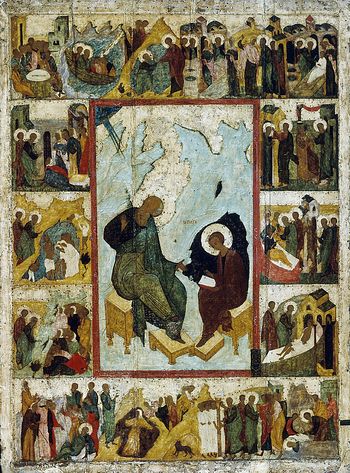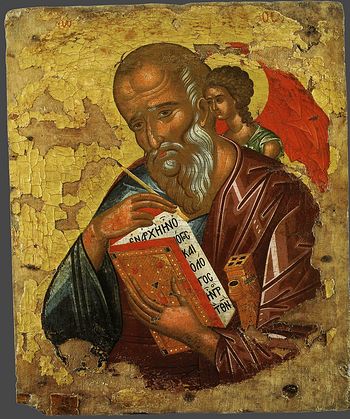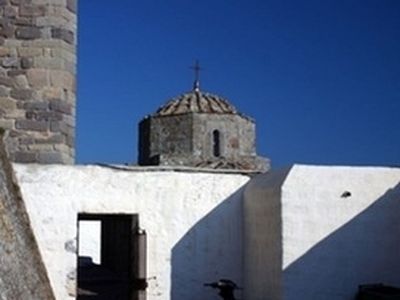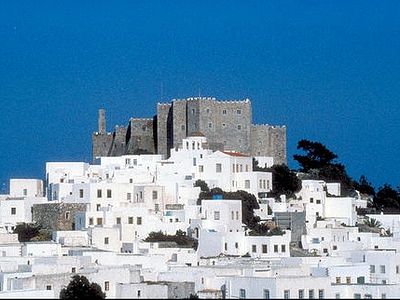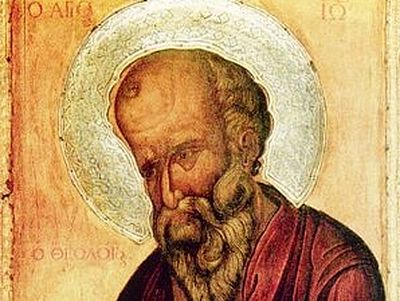In the fall of 1962 or 1963, my husband and I arrived in Bad-Kissengen for a course of treatment at one of the sanatoriums. The following day I found my way to the Russian church, where I met the rector, Fr. Michael Zagoryansky. From the first moment of our acquaintance, this meek, amiable and kindly pastor became very dear to me. Our shared admiration for Vladika John (Maximovitch) undoubtedly contributed to this feeling of closeness.
Fr. Michael's matushka was ill, and there were very few parishioners in Bad-Kissengen at that time, but this did not keep Fr. Michael from adhering to a schedule of regular services.
I began attending all the Divine Liturgies, and frequently found myself the only one present at those services, besides Fr. Michael. This was the case on the feastday of Saint John the Theologian.
At the end of the service, Fr. Michael came out of the altar holding a folded piece of paper; it was a handwritten sermon. The fact that I was the sole parishioner did not deter Fr. Michael, and he proceeded to deliver the sermon as if he were standing before a whole crowd of worshipers. As he read, tears rolled down his cheeks. His emotion communicated itself to me, and I, too, began to weep. Afterwards, when I approached to kiss the cross, I asked Fr. Michael to give me the sermon that I might copy it, as I wanted to preserve it for others.
Subsequently, my husband and I were deprived of all our possessions, and the manuscript with the sermon was lost.
In 1969, God's Providence led my husband and me to settle in Jerusalem. (There, my husband, a German Protestant, was received into the Holy Orthodox Church.)
In 1975, on May 21, the feast of Saint John the Theologian, which also happened to be my birthday, one of the nuns at the Mount of Olives convent unexpectedly gave me a booklet: The Apocalypse and Other Divinely-inspired Writings of the Holy Apostle and Evangelist John the Theologian. The booklet was missing its cover, and the tattered pages were yellow with age. The first article was titled, "The Holy Apostle and Evangelist John the Theologian -Bearer and Preacher of Divine Love." This was the very same sermon that Fr. Michael Zagoryansky had read and which had been lost. Here it was again in my hands.
Glory, O Lord, to Thy wondrous Providence and to Thy
ways, which are past finding out.
Elena Konstantinovna Hellige
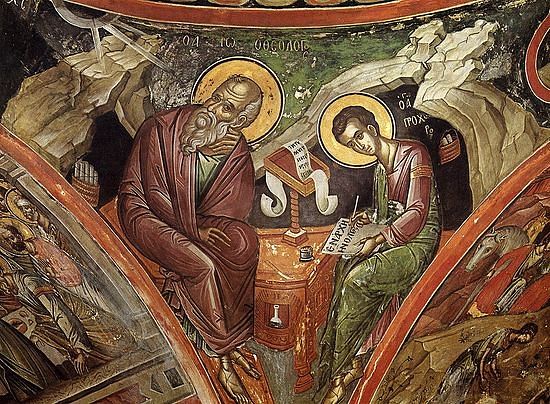 St. John the Evangelist and his disciple Prochoros
St. John the Evangelist and his disciple Prochoros
Saint John, the beloved disciple of Christ, called "the Theologian" because of his lofty teaching concerning the Son of God, God the Word, was the son of the Galilean fisherman Zebedee and his wife, Salome, and the brother of the Apostle James. The Lord Jesus Christ loved all His disciples, but He had a particular love for John, who was the youngest of the apostles, and who was an innocent, and pure youth, aflame with boundless love for his Divine Teacher. John was that apostle of whom the Gospel says, "the disciple whom Jesus loved." It was the Lord's will that he shine longer than all the other apostles on the horizon of the apostolic age; he reposed at the beginning of the second Christian century.
The Lord expressed His particular love and trust in John especially powerfully and clearly in the final moments of His earthly life, when, from the Cross, He entrusted him with the care of His Most Pure Mother, and gave him to His mother to be adopted as a son. In so doing, the Lord confirms His profound love and special trust in John. He says, as it were, "Only to thy love, My beloved disciple, do I entrust My most precious treasure. Care for her as a son, for you are worthy of that kinship." In taking upon himself the great and holy task of a son's care for the Most Holy Virgin Mary, John wholly devoted himself to the fulfillment of this lofty responsibility.
Very little is actually known concerning the life and activity of this holy apostle. It is certain only that after the Dormition of the Theotokos (c. AD 47), Saint John left Palestine. According to the tradition of the Church, he preached the Gospel in Rome, for which he was subject to torture. Afterwards he settled in the city of Ephesus, and this capital of Asia Minor became the center of his apostolic activity. From Ephesus the Apostle oversaw the life of many surrounding church communities, making frequent personal visits. Ephesus was at that time the center of intellectual life for the whole of Asia Minor and western Asia, and was in close contact with Alexandria, famed for its philosophical schools. The latter attracted many who, not satisfied with a simple and straightforward understanding of Christianity, began to analyze and expound it from a philosophical perspective, thereby distorting the Gospel truth, falling into error, and even denying Christianity altogether. Such persons Saint John called "antichrists," and he directed much of his inspired preaching against them. At the head of these false teachers stood a certain Cerinth, who combined elements of Christianity with elements of Judaism and paganism - to the extent that he formed a new, thoroughly heretical teaching that was a complete repudiation of Christianity. In refuting the false teaching of this antichrist, Saint John clearly set forth the evangelical teaching, saying, Anyone who denies that Jesus is the Christ, the Son of God, is an antichrist.
The bishop of the Church at Ephesus was Timothy, a disciple of the Apostle Paul. Nevertheless, it was Saint John who had principal oversight over the church and to whom all the Christians - pastors and flock - were devotedly submitted.
In the reign of the Roman emperor Domitian (AD 81-96), a cruel persecutor of Christians, Saint John was slandered as an enemy of the regnant polytheist religion, an especially dangerous and pernicious enemy, and the saintly man was taken for trial to Rome, where he was subjected to harsh beatings, forced to drink poison, and, finally, thrown into a cauldron of boiling oil. But the Lord preserved His chosen servant, and even the most frightful tortures left him unharmed. Unable to comprehend God's wonderworking power, the outraged pagan emperor exiled the holy Apostle to the deserted island of Patmos. Saint John, however, did not remain long in exile. In AD 96 Domitian was murdered and all his decrees were rescinded by his successor on the imperial throne, the Emperor Nero. Saint John returned to Ephesus, where he remained until his blessed repose.
Having experienced in himself the extraordinary effect of the all-illuminating Divine love, John zealously taught other Christians how to assimilate this Divine feeling. He himself was wholly penetrated and was aflame with self-sacrificing love towards his spiritual children.
Greater love hath no man. . .
During one of his rounds of visits to the surrounding churches, in the city of Smyrna, the holy Apostle noticed among his listeners a youth of fair countenance and an evidently lively intelligence. Turning to the local bishop, Saint John said to him: "I am entrusting you with this youth in the presence of the entire church, and I call to witness Jesus Christ." The bishop accepted this charge and promised diligently to look after the youth's welfare.
The Apostle returned to Ephesus, and the youth was instructed in the law of God and was baptized. The bishop, thinking that he was thereby relieved of any further concern for the youth, slackened his attention, and soon lost track of the boy. Meanwhile, some corrupt peers drew the youth into their company. He began attending their revelries and taking part in their nocturnal raids. Eventually he became the ring-leader of his own band of thieves.
Some time passed and the affairs of the Church brought Saint John again to Smyrna. When these were settled, the Apostle turned to the bishop: "Return to me the pledge with which Jesus Christ and I entrusted you in the presence of your church." The disconcerted bishop did not straightway understand just what the Apostle meant by this, but then he tearfully confessed that the youth had died to God; he had given himself over to sin, and had become the leader of a band of outlaws, with whom he was hiding in the mountains. On hearing these words, the Apostle rent his garments and groaned. "Indeed, I thought I left the soul of my brother with a good watchman. Give me a horse and a guide." Without losing any time, he headed for the mountains, where he was soon seized by some of the band's lookouts. "Take me to your leader," insisted the Saint. "I have come here purposely to see him." When John was brought into the presence of the ataman, the latter recognized him immediately. He was so taken aback that he turned to run away in shame. The Apostle, disregarding his advanced years, took after him, shouting, "My son! Why are you running away from your father? I am old and unarmed. Have pity on me! My son! Do not be afraid of me. You can still hope in salvation. I would willingly die for you, just as Christ died for us. I would give my soul for you. Believe me. I am sent by Christ!" The young man stopped. He hung his head, threw aside his weapon, and with tears threw himself into the Apostle's embrace, trembling with emotion. He asked his forgiveness, weeping bitterly and trying to find in his tears a second baptism. The Apostle fell with love to the feet of the brigand, kissed his right hand, a hand defiled with many murders and crimes, and promised to plead on his behalf that the Lord would forgive him. Together with the repentant criminal, the holy Apostle prayed and fasted, and he instructed, encouraged and consoled him with citations from Holy Scripture. Together they returned to the city, where Saint John led the brigand chief into the church as a remarkable example of repentance and of the quickening triumph of his apostolic love.
This apostle was wholly permeated by love for his neighbor. His zeal for the salvation of those who were perishing knew no obstacles. And the meekness, humility, and kindness of this great apostle were so amazing and touching, that he seemed to be not a man but an angel incarnate. His entire life was a life of love. In deep old age, when his physical strength had spent itself so that he could move about only with difficulty, he continued nevertheless, with the assistance of his disciples, to attend the Christian gatherings, teaching and edifying the flock.
At the end of his life, the holy Apostle limited his preaching to the brief exhortation: Children, love one another! When asked why he repeated one and the same thing over and over, the holy Apostle replied, "This is the command of the Lord, and if you fulfill it, it is sufficient."
The holy Apostle and Evangelist John reposed in the year AD 105, having surpassed ninety years of age. He was buried in Ephesus, where his grave became a place of pilgrimage for Christians desiring to bow down before the holy remains of "the disciple whom Jesus loved."
Translated from Pravoslavnaya Rus', 1976, No. 4.
